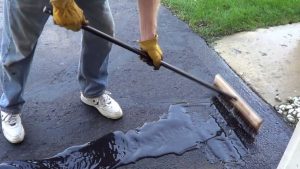How Long Does Asphalt Take To Dry?
 If you are thinking of laying asphalt on your driveway, but you are not sure how long does asphalt take to dry, then you are no different from others. Certainly, you will be hit by different questions: Is it safe to drive over freshly pitched asphalt or the best weather to pave your driveway.
If you are thinking of laying asphalt on your driveway, but you are not sure how long does asphalt take to dry, then you are no different from others. Certainly, you will be hit by different questions: Is it safe to drive over freshly pitched asphalt or the best weather to pave your driveway.
Well, before answering all those questions, you need first to understand how you can dry your newly done asphalt more quickly. This will lead you to land your tire on freshly made asphalt as soon as possible.
Also, it is equally important to know about the differences between asphalt cure time and asphalt dry time because it will save your tire from being damaged. So without any delay, let’s head on to our main topic:
How does the weather play its role?
The drying process of asphalt is going to be prolonged in both hot and cold weather. The experts recommend that you should pave your road on a dry day, with low humidity and high wind levels.
The asphalt will be soft, and it will be hard to dry on a hot, humid day. Remember, the more humid the day is, the longer it will take time for asphalt to dry.
The new asphalt always takes time to cool down, but sometimes you can use water to cool it down. But it is highly suggested not to work in extreme weather conditions, and it is the best idea to avoid asphalt works if the temperature is above 100°F.
Wintertime is another bad weather condition to do asphalt repairs or paving work. Because in winter, the asphalt gets hardened before you finish it and get on to another block.
But you can do some minor repair work, but it is not recommendable.
You should completely avoid doing any paving work or even asphalt repairs because rain will make the asphalt dry slowly, and it will cause damages to freshly pitched asphalt.
The best time to do your paving work on your driveway is spring or early summer. Make sure the day is not too cold or too hot, and there is some noteworthy breeze.
Curing process of newly paved asphalt:
The curing process actually needs more time because the newly made asphalt takes time to get cured and hardened enough. The curing process mostly depends on weather conditions, but you can take proper steps to help new asphalt cure quicker and better:
- Do not drive or park your car over it for five full days after paving.
- Keep heavy vehicles away from the newly made asphalt.
- Don’t park at the same spot over and over again.
- Do not walk over it.
- Avoid placing sharp objects over it.
- Do not drive close to the edge of new asphalt.
- Make sure there is a proper drainage system.
You can follow these steps to make your new asphalt cure better, harden enough, and long-lasting.
Is curing your new asphalt the same as drying?
 No, curing is entirely different than drying because curing is when the new asphalt fully gets hardened permanently.
No, curing is entirely different than drying because curing is when the new asphalt fully gets hardened permanently.
While drying refers to the new asphalt has dried up not entirely, but it is open for small traffics.
Asphalt usually takes 6 to 12 months to be fully cured, but it depends on the weather, the thickness, and the mix of ingredients.
During this curing process, the color of the asphalt turns black to gray, and the extremely heavy vehicles should fully avoid driving over it.
Sealing process of your asphalt:
Sealing or seal coating is the way of applying a protective layer of coating to asphalt in order to protect it from water, oils, or hot temperature.
You can seal your driveway every 1 to 3 years, depending on the condition of the asphalt. An overuse of coating can damage the asphalt by peeling or cracking.
You can go for the sealing process if the following signs show up:
- Cracks in the driveway.
- Potholes in the road.
- The pavement is severely damaged.
When you cannot apply your asphalt sealer:
There is some specific time when you cannot apply your asphalt sealer because it can cause permanent damages to your road.
- You cannot apply asphalt sealer immediately on newly made parking lots.
- If you apply it too early, it can create an interruption in the process of oxidation causing more oil to the mixture.
- Before seal coating to a commercial parking lot, it is recommended from the companies wait at least 40 days.
- But if you also wait for too long to seal your asphalt, it may lead to cracking, causing the loss of too much oil.
So it would be best if you were more careful when applying the asphalt sealer to your driveway or pavements.
How long does it take the asphalt sealer to dry?
 Generally, the asphalt sealer will get dry in 4 to 8 hours, but it needs to have stayed for 12 hours in normal weather in order to be fully cured.
Generally, the asphalt sealer will get dry in 4 to 8 hours, but it needs to have stayed for 12 hours in normal weather in order to be fully cured.
But you have to let the asphalt dry for almost 24 hours in hot weather conditions.
How to make a cold asphalt patch?
The best way to cover the cracks and holes on driveways is by using cold patches. The cold patch is made for repairing the existing asphalt surfaces.
The cold patches can be used immediately after the repair is done. Cold patches can take up to 12 to 36 hours to dry and almost 30 to 90 days to cure.
You can follow the below steps to cover the holes or dents by the cold patch:
- Please get rid of the loose asphalt and clean it with detergent and water.
- Pour the cold mix over the hole and make sure it gets covered fully.
- Make sure the cold mix patch is 1.5 inches above the surface.
- Use a towel or temper to compress the mix and if the mix is too low from the surface, then add more asphalt.
- Add some sand to it so it doesn’t get stuck.
You have to wait at least for a few weeks if you want to cover it with a sealer.
Final Findings:
It is totally up to you whether you will repair your driveway now or later, but you need to make sure that you do it in the right way and right time.
It is also crucial for you to have an idea about the differences between dry asphalt time and cure time. The asphalt cure time basically takes one year to be fully functional. While asphalt cure time is approximately 2 to 3 days and you can soon drive your vehicles over it.
From now on, you must be clear on how long does asphalt take to dry, and you are ready to go to make your own new driveway.
